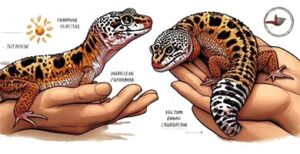Feeding leopard geckos a nutritious and varied diet is essential for their health and well-being. Here are some feeding tips to ensure your gecko receives optimal nutrition:
1. Insect Selection:
Offer a variety of appropriately sized live insects to provide dietary diversity and enrichment. Suitable feeder insects include crickets, dubia roaches, mealworms, superworms, waxworms, and small locusts. Avoid feeding insects caught in the wild, as they may carry parasites or pesticides.
2. Gut Loading:
Gut load feeder insects with nutritious foods before offering them to your gecko. Feed insects a high-quality gut load diet rich in vitamins and minerals, such as leafy greens, vegetables, fruits, and commercial gut load products. This enhances the nutritional value of the insects and benefits your gecko.
3. Supplementation:
Dust feeder insects with calcium and vitamin supplements to ensure your gecko receives essential nutrients. Use a calcium supplement without vitamin D3 at every feeding and a multivitamin supplement containing vitamin D3 once or twice a week for juveniles and less frequently for adults. Follow the recommended dosage guidelines based on your gecko’s age and size.
4. Feeding Schedule:
Offer food to juvenile leopard geckos daily and reduce feeding frequency to every other day for adults. Adjust the portion size based on your gecko’s appetite and body condition. Avoid overfeeding, as obesity can lead to health issues.
5. Monitoring Consumption:
Monitor your gecko’s feeding response and adjust the feeding schedule or prey size accordingly. Offer enough prey items to satisfy your gecko’s hunger without leaving uneaten insects in the enclosure, which can stress out the gecko and degrade habitat cleanliness.
6. Hydration:
Ensure your gecko stays hydrated by providing a shallow dish of fresh water in the enclosure at all times. Some geckos may also soak in the water dish to maintain hydration, especially during shedding. Monitor water consumption and refill the dish as needed.
7. Observation and Health Checks:
Observe your gecko’s feeding behavior, appetite, and overall health regularly. Any changes in appetite, weight, or behavior may indicate underlying health issues that require veterinary attention. Keep track of shedding patterns and ensure your gecko sheds its skin completely without any complications.
8. Variety and Enrichment:
Introduce variety into your gecko’s diet by occasionally offering different feeder insects or occasional treats like small amounts of fruit or vegetable matter. Providing enrichment through varied prey items and feeding methods can stimulate your gecko’s natural hunting instincts and prevent boredom.
By following these feeding tips and providing a balanced diet, you can promote the health, vitality, and longevity of your leopard gecko. Remember to consult with a reptile veterinarian for personalized dietary recommendations and guidance on your gecko’s specific nutritional needs.



